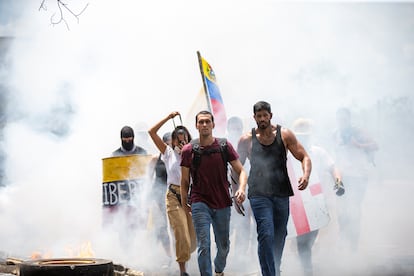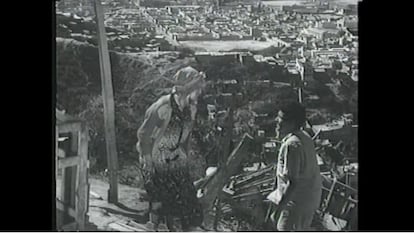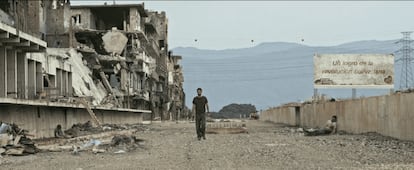Two Venezuelas in the cinema: The poor people who embraced Chavismo and the new diaspora that criticizes a failed political project
The film ‘Simón’ — which addresses the 2017 protests against the Maduro government in an unprecedented way — is one of many new productions by Venezuelan directors in the diaspora, whose work is in stark contrast to the pro-Chavista social realism of the past

On the one hand, there are the old, analog images: grainy footage of factory workers parading, veritable slaves to their condition. Then, there are shots of the poor people trying to escape the shantytowns of Caracas, the sectors where Chavismo — the movement named after Hugo Chávez, who governed Venezuela from 1999 until 2013 — found its greatest support. These are samplings of the content that makes up the historical film series that’s being screened by the Venezuelan Embassy in Spain, until March 6.
On the other side of the spectrum, there are crisp images shot with digital cameras, in films starring the Venezuelan revolutionary leaders of today, who point to the Chavista government — led by Nicolás Maduro since 2013 — as being responsible for hyperinflation, mass emigration and rampant crime. This is the case of Simón, one of the numerous productions made by Venezuelan creators in the diaspora over the last five years. Reflecting the current political and social crisis of the South American country, it will hit Netflix on March 1. This before and after in Venezuelan cinematography reflects the enormous changes that the country has gone through.
Simón has already been seen by 120,000 people in Venezuelan movie theaters. And it swept the Venezuelan Film Festival with six awards — including Best Picture — and brought Venezuela back to the Goya Awards in Spain after a seven-year-long absence from nominations for Best Ibero-American Film (it ultimately lost to The Eternal Memory, a Chilean picture).
For the first time, a feature film addresses the 2017 protests against the government of Nicolás Maduro, which left 124 dead according to the Public Ministry, or 164 according to the NGO Foro Penal. Both Venezuelans and foreigners were impacted by the images of military repression and details of torture that appear in the memories of the protagonist, who faces the dilemma of requesting asylum in Miami, without the option of ever returning. “I felt guilty that my people were being killed while I was studying film in Los Angeles,” says 30-year-old director Diego Vicentini. He has spent the last 15 years in the United States.
Originally from Caracas, he wrote the script based on interviews with student leaders who participated in the revolt. He researched El Helicoide, a notorious prison where some 290 political prisoners are still held and “serious violations of human rights” occur, according to the United Nations. Vicentini also collected the testimonies of former prisoners, who spoke about how the guards would pour orange juice on them, so that they would be devoured by insects at night.
“With 20,000 spectators, it would have already been a success — and now we’re the highest-grossing film in Venezuela in the last six years,” Vicentini notes proudly.
If the decline of Venezuela is presented chronologically, Simón would be a spiritual sequel to the documentary Once Upon a Time in Venezuela (2020). The debut feature by Anabel Rodríguez, 46, premiered at the Sundance Film Festival. It was a pioneer in showing the Chavista regime’s methods of corruption, such as vote-buying. The director portrays this through the surreal town of Congo Mirador, located in the south of Lake Maracaibo. It’s gradually disappearing, due to the sedimentation caused by oil spills. Rodríguez made 14 trips there between 2013 and 2018, to intertwine the fall of a small town — led by the United Socialist Party of Venezuela (PSUV) — with the collapse of institutions in Venezuela.
The film ends with the historic parliamentary elections of 2015, when the opposition won a majority in the National Assembly for the first time in 16 years. Two years later, Maduro would form a parallel National Constituent Assembly with greater legislative power. Precisely, this would lead to the 2017 demonstrations, upon which Simón is based. “The decision to choose a remote town like Congo Mirador was a way of narrating a period of time from a marginal position, on the sidelines of things,” Rodríguez explains, in a phone call with EL PAÍS from Vienna, Austria, where she has lived for the past 12 years.
The low-income population that now repudiates Chavismo on the big screen is the same audience that was previously subjected to Hugo Chávez’s propaganda. The lowest strata of society was always present in Venezuelan cinema, as far back as La Escalinata (1950), which is about the peripheral Caracas neighborhoods with corrugated iron roofs, where residents climb up shaky steps. However, today, low-income Venezuelans — once the base of the PSUV — have become the biggest critics of the Maduro government.
One of the historical filmmakers who documented these settlements — mainly built by peasants migrating from the countryside — was Román Chalbaud, a declared Chavista long before his death in 2023. He was best known from the film Caín adolescente (1959), shot in a Caracas shantytown, which tells the story of a widow and her son.

Cinema made from the diaspora
Migration is no longer from the countryside to the city, as occurred in the 20th century. Nowadays, millions of Venezuelans go abroad. Both Vicentini and Rodríguez left Venezuela for the same reason: a lack of security and economic precariousness. 37-year-old Nico Manzano and 34-year-old Flavio Pedota — born in Caracas and Maracay respectively — also belong to the generation of filmmakers who produce their works abroad. “I never wanted to leave, but I remember how, one week, when we lost power, I was doing post-production on my film. I told myself: ‘[The blackouts] didn’t even allow me to finish my movie. I have to get out of here,’” Manzano recalls. He’s the director of Yo y Las Bestias (2021), the story about a down-and-out musician living in a country where he has to pay bribes to the police, or listen to Maduro’s voice haranguing the people every time he turns on his car radio.
If his film is an indie production with an implicit anti-government touch, Pedota’s 2019 film Infección — a zombie flick — serves as a metaphor for a Venezuela where chaos reigns and the government is oblivious to what’s happening. “Zombies represent anarchy and there were moments in Venezuela of true anarchism,” he says about his film, which was screened at various Spanish festivals.

Infección was never released in Venezuelan theaters. The film couldn’t obtain the certificate granted by the National Autonomous Center of Cinematography (CNAC), which allows, by law, for a film to be shown in theaters for at least two weeks. “After being in an approval process — which usually lasts two weeks — for eight months, they told me that I couldn’t explain the origin of the funds [that I used to make the movie] and that I should present my film as ‘international.’ I refused and pointed to this as an act of censorship,” Pedota declares.
Censorship or self-censorship?
Carlos Azpurúa — the president of CNAC since 2021 — responds to the controversy in an interview with EL PAÍS: “The film — with clear and decisive political advocacy strategies — couldn’t prove the origin of its funds. [The production team] mounted an international campaign in which they claimed that the state vetoed them and that there’s censorship. Not at all! If there had been censorship, the first [film we would have censored] would have been Simón. They created a discourse that it was going to be the film that [the authorities] were going to ban, and they were left wanting.”
According to Manzano, freedom of creation in Venezuela is a gray area. “Censorship isn’t applied so much by the state — it’s more of a self-censorship [implemented by] the media, for fear of reprisals. They were very careful when they interviewed me on the radio; they asked me not to mention certain words or refer to the [economic and humanitarian] crisis. Many media outlets were closed.” 110 Venezuelan newspapers have stopped circulating over the past two decades, while hundreds of radio stations and TV channels have been shut down.
Lorena Colmenares concurs with this description. She screened her short film — The Red Spiral — at the 2023 Locarno Film Festival in Switzerland. It’s about a school of indoctrination in a fascist country that’s set to receive a visit from the so-called “Great Commander.”
“I was very afraid to show the [film] in Venezuela, especially when it came to protecting the privacy of [the child actors]. It’s a story that’s very critical of the government and I didn’t want doors to be closed on the children because of this,” the filmmaker told analitica.com — a Venezuelan newsite — from New York, where she lives.

Whether screened in their homeland or on large international stages, the diaspora wants to continue telling stories about Venezuela. They try to convince international capital that it’s a good idea to “talk about a country in crisis,” as Rodríguez notes. Manzano concludes: “In the past, we weren’t so patriotic, we weren’t so aware of what was ours. When you go to one extreme, it’s bad, but the other side is also harmful: being a country with low-self esteem.”
“We need more films, which don’t just offer the perspective of Simón. We need many others to tell the stories of a country, which can never be summed up in just one.”
Sign up for our weekly newsletter to get more English-language news coverage from EL PAÍS USA Edition
Tu suscripción se está usando en otro dispositivo
¿Quieres añadir otro usuario a tu suscripción?
Si continúas leyendo en este dispositivo, no se podrá leer en el otro.
FlechaTu suscripción se está usando en otro dispositivo y solo puedes acceder a EL PAÍS desde un dispositivo a la vez.
Si quieres compartir tu cuenta, cambia tu suscripción a la modalidad Premium, así podrás añadir otro usuario. Cada uno accederá con su propia cuenta de email, lo que os permitirá personalizar vuestra experiencia en EL PAÍS.
¿Tienes una suscripción de empresa? Accede aquí para contratar más cuentas.
En el caso de no saber quién está usando tu cuenta, te recomendamos cambiar tu contraseña aquí.
Si decides continuar compartiendo tu cuenta, este mensaje se mostrará en tu dispositivo y en el de la otra persona que está usando tu cuenta de forma indefinida, afectando a tu experiencia de lectura. Puedes consultar aquí los términos y condiciones de la suscripción digital.









































